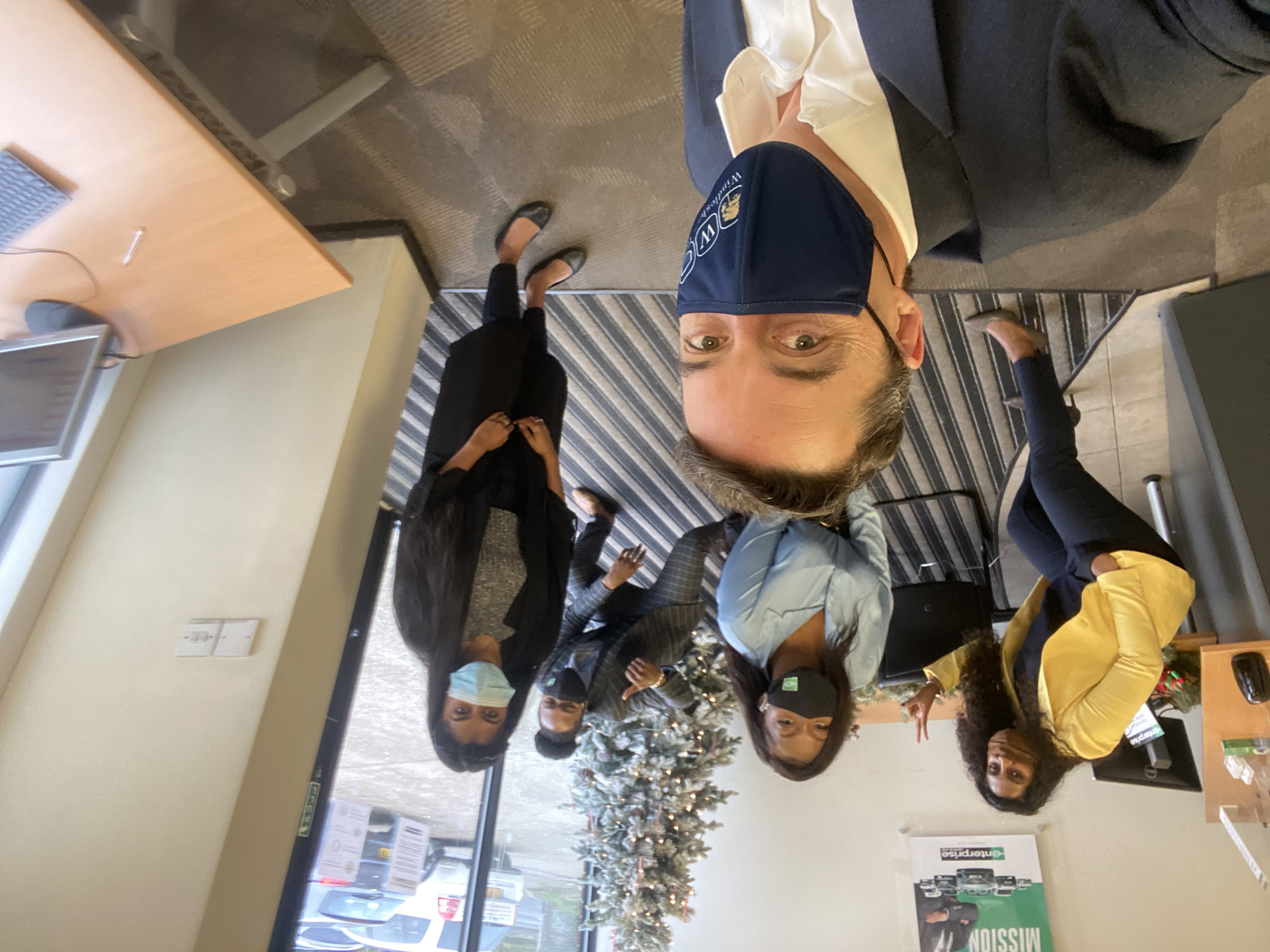Reverse mentoring supports inclusive leadership
Mentoring is central to Enterprise’s talent development. The mentoring culture is so vibrant that a conversation between an Assistant Manager and a UK Vice President became an official 12-month reverse mentoring pilot in which senior managers were mentored by more junior ethnic minority employees. The pilot has now been extended and the opportunity to include other diversities is being explored.

"I realised that senior managers needed to be aware of experiences that only affect black employees" (Temi Soyinka)
The initiative has been driven by Temi Soyinka, who joined Enterprise’s Management Training Programme in 2018 and who has since been promoted to Branch Manager.
It evolved from her positive mentoring experience of being encouraged to apply for the Airport Leadership Team in Gatwick after only five months with the company.
“My mentor thought the airport move would be a good opportunity for me,” Temi told DRIVE. “He was right. After five months at Enterprise, I thought I knew everything. Then I joined Gatwick and realised how much I had to learn.”
"It really stood out to me that Enterprise cares about diversity because of events like Minorities in Leadership" (Temi Soyinka)
Temi met her mentor at a Minorities in Leadership event six weeks after joining Enterprise.
“He asked if I wanted him to be my mentor. Of course, I did! He then introduced me to other senior people who also volunteered to be mentors. Everyone joked about all my mentors! I deliberately chose people from different parts of the business: vehicle repair, accounts, sales, so that I could learn as much as possible.”
Promoted to Branch Manager when she was pregnant, Temi explained that mentoring has opened her eyes to the opportunities in car rental.
“I studied architecture and I wanted to work in beauty. I never imagined that I would stay at Enterprise for long. Having a mentor inspired me. He was my number one cheer leader. I felt that somebody senior cared about me and could relate to me because he had been a Management Trainee and done my job.”
The idea of starting a reverse mentoring initiative emerged when it became apparent that senior managers needed more exposure to the frontline experiences of ethnic minority employees.
“I am very passionate about being a black Nigerian woman,” Temi said. “It really stood out to me that Enterprise cares about diversity because of events like Minorities in Leadership. I had worked for four different companies, and none had anything like this.”
But the pandemic meant these events were suspended.
“I wanted to maintain those conversations and encourage ethnic minority employees, give them the tools that they need to be successful in this career.”

Ryan Johnson, Managing Director UK & Ireland
"This program creates an environment of listening, learning, and development for our Executive Team and empowers our employees to play an active role in improving our future" (Ryan Johnson)
Now a Branch Manager, ethnic minority employees would turn to Temi for support in handling situations in the branch.
“I realised that senior managers needed to be more aware of experiences that only affect black employees and which they wouldn’t see because operationally, most issues are resolved at branch level. That’s very empowering as a manager: you don’t need to escalate or get authorisation. It also means that information doesn’t get back up the organisation. Senior managers can’t know what they don’t see.”
Reverse mentoring was an opportunity to help senior managers from all backgrounds and ethnicities to understand the unique challenges facing ethnic minority employees.
“Some ethnic minority employees may feel more confident working in a more diverse inner-city branch, which means they don’t apply for jobs in areas with a different demographic. That’s something managers need to know.”
When Vice President Adam Lovelock joined Temi’s regional group and visited her branch, she saw the opportunity to pitch her idea.
“I am quite outgoing so I outlined my idea about how reverse mentoring would give senior managers an invaluable view of life through the eyes of a more junior ethnic minority employee and how this could create a better working environment for everyone.”
A good example is how reverse mentoring helps managers to grow as inclusive leaders.
“Adam could see how reverse mentoring would create an environment where managers could learn, for example, how to ask questions in a culturally sensitive way. ‘Where are you from?’ is a good example. So many Enterprise employees have the experience of coming from other countries, we need to be able to talk about these things respectfully.”

Adam Lovelock, Vice President (foreground) with Temi (centre) and her team
"I could immediately see how reverse mentoring with someone from a very different background could create opportunities for my team and help me to be a better leader" (Adam Lovelock)
Managers rapidly came on board with the programme as mentees, and ethnic minority employees were equally keen to be involved as mentors.
“Ethnic minority employees immediately saw the opportunity to have that direct line of communication with senior management and to use it as a way to get them to share our perspective.”
Adam said, “I could immediately see how reverse mentoring with someone from a very different background could create opportunities for my team and help me to be a better leader. I know that Temi is always there to provide a fresh diverse perspective. I was completely behind the initiative and really impressed that Temi had come to me to suggest the idea. I’m delighted that the programme has really taken off.”
Ryan Johnson, now Managing Director UK & Ireland, was another Vice President who participated in the programme. He said, "I simply cannot overstate the power of our reverse mentoring program. As we move forward as an organisation, the most impactful aspect of our DE&I strategy is accelerating the learning and education that will inform our actions. This program creates an environment of listening, learning, and development for our Executive Team and empowers our employees to play an active role in improving our future."
The programme is regularly reviewed and adjusted as people are promoted or move location and mentors are regularly rotated to benefit both parties. All the pairs have flexibility about how often they would meet and what they discuss.
“I have a scheduled meeting with Adam every two months. In between we maintain an open dialogue and message each other questions any time. It’s a very supportive and active relationship.”
"Managers rapidly came on board as mentees, and ethnic minority employees were equally keen to be involved as mentors"
